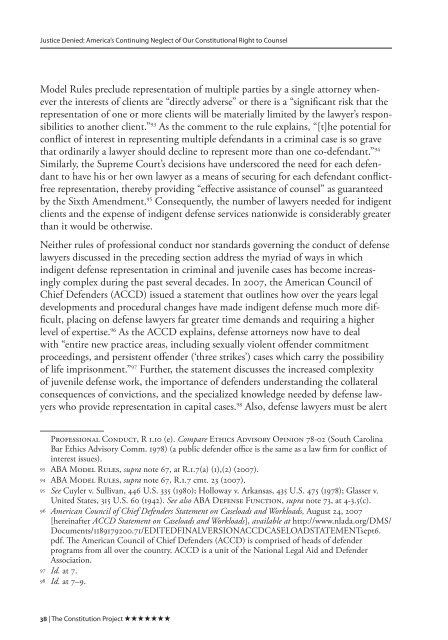Justice DenieD
Justice DenieD
Justice DenieD
You also want an ePaper? Increase the reach of your titles
YUMPU automatically turns print PDFs into web optimized ePapers that Google loves.
<strong>Justice</strong> Denied: America’s Continuing Neglect of Our Constitutional Right to Counsel<br />
Model Rules preclude representation of multiple parties by a single attorney whenever<br />
the interests of clients are “directly adverse” or there is a “significant risk that the<br />
representation of one or more clients will be materially limited by the lawyer’s responsibilities<br />
to another client.” 93 As the comment to the rule explains, “[t]he potential for<br />
conflict of interest in representing multiple defendants in a criminal case is so grave<br />
that ordinarily a lawyer should decline to represent more than one co-defendant.” 94<br />
Similarly, the Supreme Court’s decisions have underscored the need for each defendant<br />
to have his or her own lawyer as a means of securing for each defendant conflictfree<br />
representation, thereby providing “effective assistance of counsel” as guaranteed<br />
by the Sixth Amendment. 95 Consequently, the number of lawyers needed for indigent<br />
clients and the expense of indigent defense services nationwide is considerably greater<br />
than it would be otherwise.<br />
Neither rules of professional conduct nor standards governing the conduct of defense<br />
lawyers discussed in the preceding section address the myriad of ways in which<br />
indigent defense representation in criminal and juvenile cases has become increasingly<br />
complex during the past several decades. In 2007, the American Council of<br />
Chief Defenders (ACCD) issued a statement that outlines how over the years legal<br />
developments and procedural changes have made indigent defense much more difficult,<br />
placing on defense lawyers far greater time demands and requiring a higher<br />
level of expertise. 96 As the ACCD explains, defense attorneys now have to deal<br />
with “entire new practice areas, including sexually violent offender commitment<br />
proceedings, and persistent offender (‘three strikes’) cases which carry the possibility<br />
of life imprisonment.” 97 Further, the statement discusses the increased complexity<br />
of juvenile defense work, the importance of defenders understanding the collateral<br />
consequences of convictions, and the specialized knowledge needed by defense lawyers<br />
who provide representation in capital cases. 98 Also, defense lawyers must be alert<br />
Professional Conduct, R 1.10 (e). Compare Ethics Advisory Opinion 78-02 (South Carolina<br />
Bar Ethics Advisory Comm. 1978) (a public defender office is the same as a law firm for conflict of<br />
interest issues).<br />
93 ABA Model Rules, supra note 67, at R.1.7(a) (1),(2) (2007).<br />
94 ABA Model Rules, supra note 67, R.1.7 cmt. 23 (2007).<br />
95 See Cuyler v. Sullivan, 446 U.S. 335 (1980); Holloway v. Arkansas, 435 U.S. 475 (1978); Glasser v.<br />
United States, 315 U.S. 60 (1942). See also ABA Defense Function, supra note 73, at 4-3.5(c).<br />
96 American Council of Chief Defenders Statement on Caseloads and Workloads, August 24, 2007<br />
[hereinafter ACCD Statement on Caseloads and Workloads], available at http://www.nlada.org/DMS/<br />
Documents/1189179200.71/EDITEDFINALVERSIONACCDCASELOADSTATEMENTsept6.<br />
pdf. The American Council of Chief Defenders (ACCD) is comprised of heads of defender<br />
programs from all over the country. ACCD is a unit of the National Legal Aid and Defender<br />
Association.<br />
97 Id. at 7.<br />
98 Id. at 7–9.<br />
38 | The Constitution Project


